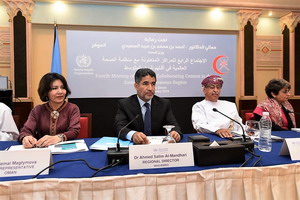 9 January 2019 – The fourth meeting of WHO collaborating centres in the Eastern Mediterranean Region is being held in Muscat, Oman, from 9 to 10 January 2019, attended by WHO experts and heads of collaborating centres.
9 January 2019 – The fourth meeting of WHO collaborating centres in the Eastern Mediterranean Region is being held in Muscat, Oman, from 9 to 10 January 2019, attended by WHO experts and heads of collaborating centres.
The meeting aims to review updated policies regulating the designation of collaborating centres and streamline centres’ collaboration with WHO. The meeting will discuss challenges faced by collaborating centres in implementing planned activities in support of the Organization’s programmes.
Collaborating centres are institutions designated by WHO’s Director-General to form part of an international collaborative network carrying out activities in support of WHO’s programmes and to develop and strengthen institutional capacity in countries and regions.
“Designating a qualified institution as a collaborating centre recognizes a history of collaboration with WHO and provides a formal framework for future joint activities. Collaborating centres represent a highly-valued mechanism of cooperation by virtue of which selected institutions are recognized by WHO, in order to support it in implementing its mandated work,” said Dr Ahmed Al-Mandhari, WHO Regional Director for the Eastern Mediterranean. “They are valuable partners and can play a great role in achieving the regional priorities identified in Vision 2023 – Health for All, by All”, which lays out the vision for WHO’s work with countries for the next 5 years.
There are currently 45 WHO collaborating centres in the Eastern Mediterranean Region, which represent 5% of the total number of collaborating centres (832), while the Region is home to 10% of the global population. “The limited number of collaborating centres in the Region may well highlight untapped resources and opportunities for establishing effective collaborating centres,” noted Dr Al-Mandhari.
Performance assessment surveys of WHO collaborating centres conducted over the past few years have revealed wide variation in the performance of various centres. The 2-day meeting in Oman offers a platform to discuss the challenges and gaps faced by collaborating centres which may affect performance. Participants will review the results of performance assessment surveys and determine how to fill identified gaps.
The meeting will also provide an opportunity to introduce and explain the Vision 2023 document so as to enable collaborating centres to align their work with the WHO Regional Office’s priorities, including expanding universal health coverage, better addressing health emergencies and promoting healthier populations.
“We hope that by the end of the meeting participants will have a better understanding of the roles and responsibilities of collaborating centres, of ways collaboration between centres in shared areas of work can be improved, gaps identified in recent surveys addressed, and suggested areas of work for potential new collaborating centres identified,” said Dr Arash Rashidian, Director of Information, Evidence and Research in the WHO Regional Office.
Oman is the first country to host such a meeting. Previous meetings were held at WHO’s Regional Office.








